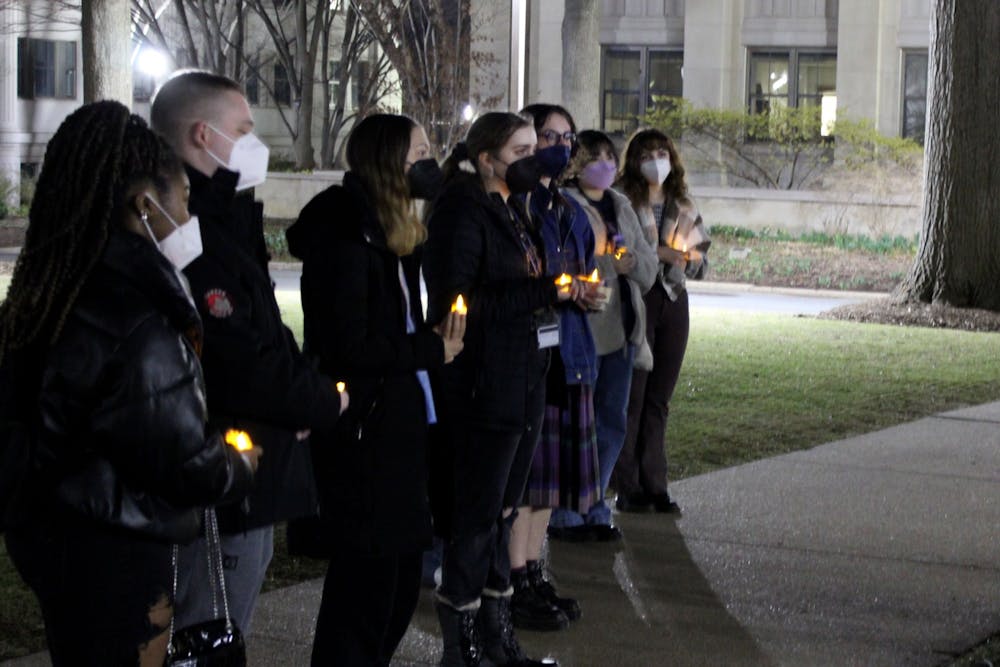American University’s Disabled Student Union hosted a vigil for Disability Day of Mourning in front of Kay Spiritual Center on March 1, which focused on detailing the lives lost because of ableism and the betrayal disabled people face in society.
The vigil was held following months of activism from AU students and the DSU raising concerns about numerous new COVID-19 policies instituted by the University, with students vocalizing concerns about the lack of mandatory testing, issues with masks and classroom requirements.
The event started with a short speech given by Katherine Greenstein, the president of DSU, explaining the importance of hosting the vigil. Disability Day of Mourning falls directly after Rare Disease Day on February 28th.
“[Disability Day of Mourning] is something we take with incredible honor every single year on March 1,” Greenstein said at the vigil.
After the short speech, students took five minutes of silence to mourn lives lost to abuse, filicide and other forms of ableism.
Helena Milburn, DSU secretary, said she hopes the vigil was able to create a safe space for disabled students on campus.
“I’m glad we were able to remind people that there are resources available for them – that the e-board is there for them if they need anything,” Milburn said.
While being glad and hopeful to be giving to the AU community, DSU members also acknowledged the weight and meaning this day holds for many.
“I would be happy if we don’t have to hold this vigil next year,” Laura Polomis, treasurer of the DSU said. “But that won’t happen, so we will continue to mourn and amplify the voices of our peers.”
Kaniya Harris, a sophomore in the School of Public Affairs and director of Women’s Initiative, was among the students in attendance at the vigil. Harris said she was glad that the vigil was able to shed light on a serious topic.
“My family has always been involved in volunteering and helping the disability community, and I grew up at home surrounded by that,” Harris said. “It’s nice to see students show up for something I feel strongly about.”
Harris also mentioned concerns for the local D.C. community, specifically citing the district’s unhoused population.
“What AU students don’t understand is that they go out clubbing, maskless, and walk through the streets, potentially spreading COVID to vulnerable populations in our communities,” Harris said.
In 2019, 36.3 percent of people experiencing homelessness in D.C. were found to be chronically unhoused —– meaning they are people with disabilities who have been experiencing homelessness for over a year. This is one of the highest rates of chronic homelessness in the country.
The vigil also addressed a lack of action from the University in listening to demands made by students at AU on COVID-19 policies.
“They have the resources,” said Jackson Beauregard, an attendee at the vigil and a junior in the School of Public Affairs. “We saw AU require mandatory testing twice a week during the minimester, we know it’s not that they don’t have the resources. AU is putting the emotions of AU students before those that require these accommodations.”
Greenstein also expressed their fear and frustration over the way AU has been handling its COVID-19 policies in an interview with The Eagle after the vigil. They showed frustration in the way AU has handled COVID-19 policies, specifically mandatory testing.
“It’s awful, just awful,” Greenstein said. “The University hears us, but they aren’t listening to us.”
In a statement to The Eagle, AU spokesperson Elizabeth Deal said the University continues to support the AU community and address concerns.
“The health and safety of our community remains our priority and our protocols, including vaccine and booster requirements and surveillance testing, help support the well-being of all community members,” Deal said.
Deal said the University encourages students with specific accommodations or health issues to contact the Academic Support and Access Center to access resources for disability-related accommodations.
“AU doesn’t protect us, we protect ourselves,” Polomis said.
Correction: A quote from Beauregard has been corrected.





